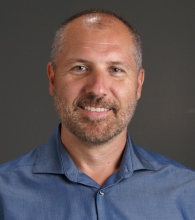HNF Canada – Dr. Benoit Gentil 2023 Report
Principal investigator responsible of the project: Benoit J Gentil
Personnel involved:
– Sandra Minnotti, technician,
– Zacharie Cheng-Boivin, Graduate student
– Alexandre Paré, Graduate student
– Genevieve McKay, undergraduate student
– Sami Azhari, undergraduate student
– Eric Lucas, undergraduate student
– Robin Dagher, undergraduate student
Results to date: In May 2022, Dr. Gentil reported that their attempts to develop a Zebrafish model
overexpressing the gene responsible for CMT1A, PMP22, was unsuccessful because the gene
sequence of PMP22 and the cDNA at his disposal was not functional. Since then, this technical
difficulty has yet to be solved, and he cannot generate a cDNA sequence expressing PMP22. Dr.
Gentil’s laboratory could not leverage the funding to generate cellular models derived from patients
called IPSC. His laboratory then focused on identifying therapeutic opportunities, and took
advantage of their ARSACS program. They are developing active peptides efficient in resorbing
aggregates of abnormal proteins like PMP22. Their active peptides did not co-localize with PMP22
and did not resorb aggregates of PMP22, characteristic of CMT1A. Proteomic analysis of the partners of their peptides did not identify PMP22, indicating that PMP22 is not a target of their peptides and that this strategy is unlikely to be translated in CMT1A.
Training of talents: HNF Canada’s support has contributed to the professional development of Dr Gentile’s students,
Zacharie Cheng-Boivin (Ph.D. candidate) and Alexandre Paré (M.Sc. candidate), the Kinesiology
and Integrated Program of Neuroscience of McGill University. In addition, the CMT project
provided laboratory experience to several undergraduate students enrolled in the Kinesiology
honors program.
Awareness strategy: Dr Gentile’s group has an active program on CMT and is committed to developing
therapeutic strategies and moving the field forward. They welcome undergraduate students during
their honor project, which contributes to raising awareness about CMT amongst some of their most promising
students. Several of these students have been enrolled in medicine, physiotherapy, or pharmacy,
which will bring more awareness toward CMT and future allies in disciplines in contact with
patients affected by inherited peripheral neuropathies. In addition, in the context of his course
EDKP449 (Exercise Physiopathology), Dr. Gentil lectures CMT and other neuromuscular
disorders to train future kinesiologists.
Perspectives: Although Dr. Gentil’s lab faced some set back in the original plan, their laboratory
still plans to study CMT1A by adding this model to the different relevant strategies developed for
other diseases studied on the laboratory. As such, they have a collaboration with Dr. Gunning
(Gunning Group | Patrick Gunning) aiming to test the therapeutic potential of a new Histone
Deacetylase (HDAC) inhibitor developed in his laboratory. HDAC inhibitors have been shown to
be efficient in resorbing cellular abnormalities of axonal forms of CMT. HDAC inhibitor, like
suberoylanilide hydroxamic acid (SAHA), has been shown to increase myelin thickness and
improve nerve conduction velocities in mouse models of CMT1A.
2021 Accomplishments
In 2021 we donated funds to Dr Gentils’ research lab at McGill University. His laboratory is setting up a research program aiming to:
1) Develop cellular models derived from patients (i.e., iPSc-derived Schwann cells) in order to have a better understanding of the molecular mechanism involving a specific mutation or overabundance of PMP22. Considering the large number of different mutations causing CMT1A, this will be key to develop mechanism-based therapeutic approaches tailored to patients, and;
2) Identify therapeutic opportunities in this model by characterizing the RNA profile of Schwann cells carrying triplication or mutations of PMP22 and;
3) Develop a zebrafish model of CMT1A over-expressing PMP22 in order characterize the pathogenesis and more importantly to provide an animal model for rapid drug testing. The generation of these models are an important step to characterize the pathogenesis and identify therapeutic approaches based on molecular mechanisms.

Promising Research and Past Accomplishments
One promising area of research involves gene therapy experiments. Research with cell cultures and animal models has shown that it is possible to deliver genes to Schwann cells and muscle. Another area of research involves the use of trophic factors or nerve growth factors, such as the hormone androgen, to prevent nerve degeneration. Vitamin C has been studied in CMT1A and the results of a multi-centric trial are due soon.
To date our gifts have helped with promising CMT research undertaken through the University of Florida and the University of Southern California. These potential therapies are all in the early stages, and have not yet been studied in humans. However, they offer hope for the future.